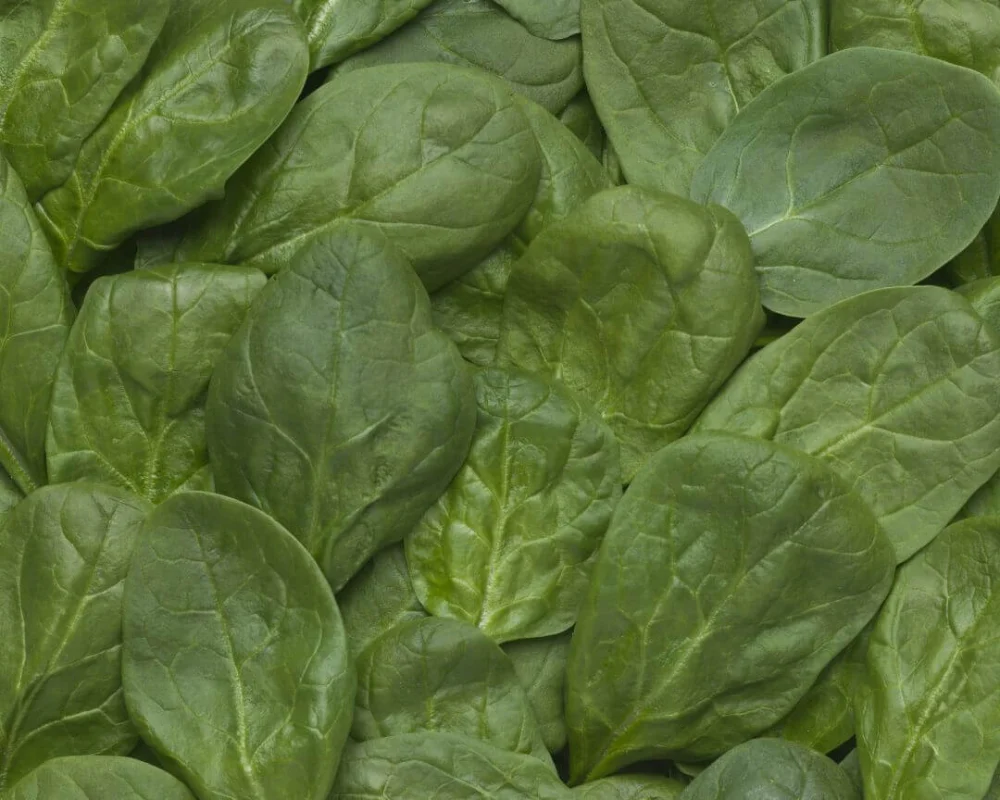Spinach isn’t just a certain cartoon sailor’s favorite snack — there’s a ton of nutrition packed into those vibrant green leaves. And did we mention it’s delicious? Let’s dive into some common nutritional questions about this versatile leafy green and learn more about why it deserves to be a constant fixture on your plate.

What are the nutritional benefits of spinach?
Lots! Spinach is a nutrient-rich superfood that boasts a pretty impressive array of vitamins and minerals. It’s particularly known for being high in vitamins A, C, and K, as well as folate and several essential minerals like iron and magnesium. These nutrients all contribute to your overall health, supporting things like immune function, bone health, and even your vision.
What is spinach good for?
Spinach has a high antioxidant content that helps fight something called oxidative stress in the body, potentially reducing the risk of chronic diseases such as heart disease and certain cancers. Plus, the abundance of vitamins and minerals supports various bodily functions, from maintaining healthy skin to aiding your digestion. More on that later!
How many calories are in spinach?
Not many! Spinach is incredibly low in calories. One cup of raw spinach contains only about 7 calories, making it a guilt-free addition to meals and snacks. Its low-calorie nature combined with high nutritional value makes it a nutrient-dense food, so don’t feel bad about loading up on the leafy green goodness when you get the chance.
Does spinach have protein?
Yes, spinach contains a modest amount of protein (roughly one gram per cup), making it a valuable addition to vegetarian and vegan diets. And while it’s certainly not as protein-dense as animal proteins or legumes, every little bit helps in meeting daily protein requirements, especially when combined with other protein sources. Try serving a bowl of spinach salad with added protein, like grilled salmon or sliced chicken.
Does spinach have fiber?
Absolutely! Spinach is an excellent source of insoluble fiber, which is essential for digestive health. Fiber promotes regular bowel movements, helps control blood sugar levels, and is actually quite satiating (i.e., it makes you feel more full after eating), which can aid in weight management.

How much iron is in spinach?
Spinach is pretty renowned for its iron content, although it contains non-heme iron, which is less readily absorbed by the body compared to heme iron found in animal products. That said, incorporating vitamin C-rich foods with spinach can enhance iron absorption, so feel free to get a little creative in the kitchen.
For example, you can start with cleaned, packaged spinach and brighten it up by squeezing lemon or lime juice on top after it’s cooked. Or combine baby spinach with fresh strawberries in salads, or mix roasted Brussels sprouts with cooked spinach for a hearty side dish. (What’s that? You didn’t know that one serving of Brussels sprouts has 124% of the Daily Recommended Value of vitamin C? Well, now you do.)
How much spinach is in a serving?
A typical serving size of spinach is about one cup raw or half a cup cooked (cooking spinach causes it to shrink to about half its size). This handy portion size gives you a practical way to incorporate spinach into your daily meals without overwhelming your plate. In fact, cooked spinach is a great side dish to delicate fish entrees or mixed into soups like minestrone or potato-spinach soup.
Does cooked spinach lose nutrition?
Cooking spinach can alter its nutritional profile just a bit, mainly affecting the vitamin C content. However, cooking also breaks down oxalic acid, which can inhibit the absorption of certain nutrients like calcium and iron. Overall, lightly cooking spinach or enjoying it raw both offer similar health benefits, so don’t let it stop you either way. Both ways are great!
How much spinach can you have in a day?
Now, that’s the spirit. While individual needs vary, eating at least one to two cups of spinach per day can provide some substantial health benefits. Whether raw in salads or cooked in your favorite dishes, try to fit it into your diet as much as possible so you can reap its nutritional rewards. (But just remember to eat some other nutritious foods as well.)
Speaking of…
Is too much spinach bad for you?
Can you really have too much of a good thing? While spinach is incredibly nutritious, consuming very large amounts regularly could potentially interfere with the absorption of certain minerals due to its oxalate content. However, for the average person, enjoying spinach as part of a balanced diet poses no health risks and offers plenty of nutritional benefits, as you now know.

Incorporating Spinach into Your Diet
Now that we’ve explored the nutritional benefits of spinach, let’s look at some delicious ways to incorporate this nutrient-rich leafy green into your diet:
Spinach in Salads
It may seem a little obvious but it’s our favorite: salads! Create a vibrant salad by tossing fresh spinach with cherry tomatoes, cucumbers, and a light vinaigrette. Add grilled chicken or tofu for a hefty protein boost! You should also check out this Summer Spinach Salad with Grilled Corn, Strawberries, and Feta recipe (summer not required).
Spinach in Smoothies
Blend spinach with bananas, berries, and almond milk for a refreshing, nutritious smoothie. Include a scoop of protein powder for an extra punch. Is a smoothie bowl more of your thing? Well, you’re in luck, we’ve got the perfect recipe for you.
Spinach in Cooked Dishes
Quickly sauté spinach with garlic and olive oil for a simple and flavorful side dish that goes with everything from grilled steak to baked salmon. You can also incorporate spinach into pasta dishes, soups, or casseroles for added nutrients and flavor. Just remember that it’s usually best to add the spinach at the end so it doesn’t get overcooked.
Conclusion: Eat More Spinach!
As you can see, incorporating spinach into your diet provides a wealth of health benefits, from supporting immune function to promoting digestive health and beyond. Whether you enjoy it raw in salads, wilted in stir-fries, or blended into smoothies, spinach’s nutritional value makes it a valuable addition to any dish.
